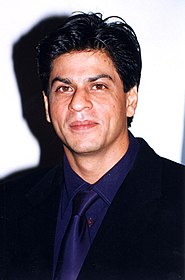Popular

Khan’s only release in 1999 was Baadshah, in which he starred opposite Twinkle Khanna. Although the film underperformed at the box office,[88] it earned him a Filmfare Award nomination for Best Performance in a Comic Role, which he lost to Govinda for Haseena Maan Jaayegi.[61] Khan became a producer in 1999 in a collaboration with the actress Juhi Chawla and the director Aziz Mirza for a production company called Dreamz Unlimited.[89] The company’s first production, Phir Bhi Dil Hai Hindustani (2000), starring Khan and Chawla, was a commercial failure.[90] It was released one week after Kaho Naa… Pyaar Hai, starring Hrithik Roshan, then a newcomer, who critics believed overshadowed Khan.[91] Swapna Mitter of Rediff.com spoke of Khan’s predictable mannerisms, saying “Frankly, it’s high time he innovated his act a little.”[92] Khan did a supporting role in Kamal Haasan‘s Hey Ram (2000), which was made simultaneously in Tamil and Hindi. He thereby made his Tamil debut by playing the role of an archaeologist named Amjad Khan.[93] He performed free of charge as he wanted to work with Haasan.[94][95] On Khan’s performance, T. Krithika Reddy of The Hindu wrote, “Shah Rukh Khan, as usual comes up with an impeccable performance.”[93]
In 2001, Dreamz Unlimited attempted a comeback with Khan portraying the title role in Santosh Sivan‘s historical epic Aśoka, a partly fictionalised account of the life of emperor Ashoka. The film was screened at the Venice Film Festival and the 2001 Toronto International Film Festival to a positive response,[96] but it performed poorly at Indian box offices.[97] As losses continued to mount for the production company,[91] Khan was forced to close srkworld.com, a company that he had started along with Dreamz Unlimited.[98] In December 2001, Khan suffered a spinal injury while performing an action sequence for a special appearance in Krishna Vamsi‘s Shakti: The Power.[99] He was subsequently diagnosed with a prolapsed disc, and attempted multiple alternative therapies. None of these provided a permanent solution to the injury, which caused him severe pain while shooting several of his films.[99][100] By the beginning of 2003, his condition had worsened to the point that he had to undergo anterior cervical discectomy and fusion surgery at Wellington Hospital, London.[101][102][103] Khan resumed shooting in June 2003, but he reduced his workload and the number of film roles he accepted annually.[100]

Successes during this time included Aditya Chopra’s Mohabbatein (2000), and Karan Johar’s family drama Kabhi Khushi Kabhie Gham… (2001),[90][104] which Khan cites as a turning point in his career.[105] Both films co-starred Amitabh Bachchan as an authoritarian figure, and presented ideological struggles between the two men.[106][107] Khan’s performances in the films were met with wide public appreciation, and he was awarded his second Filmfare Critics Award for Best Actor for Mohabbatein.[61][108] Kabhi Khushi Kabhie Gham… remained the top-grossing Indian production of all time in the overseas market for the next five years.[109]
In 2002, Khan played the title role as a rebellious alcoholic opposite Aishwarya Rai and Madhuri Dixit in Sanjay Leela Bhansali‘s period romance Devdas. At a cost of over ₹500 million (US$10.29 million), it was the most expensive Bollywood film ever made at the time,[110] and became a box office success, earning approximately ₹1.68 billion ($35 million) worldwide.[111] The film earned numerous accolades including 10 Filmfare Awards, with Best Actor for Khan,[52] and a BAFTA Award for Best Film Not in the English Language.[112] Khan next starred in Kal Ho Naa Ho (2003), a comedy-drama written by Karan Johar and set in New York City, which became the second-highest-grossing film domestically and the top-grossing Bollywood film in external markets that year.[104][113] Co-starring with Jaya Bachchan, Saif Ali Khan, and Preity Zinta, Khan received critical praise for his portrayal of Aman Mathur, a man with a fatal heart disease, with critics praising his emotional impact upon audiences.[114] Conflict broke out between Khan and the other partners of Dreamz Unlimited over the failure to cast Juhi Chawla in their 2003 production of Aziz Mirza’s Chalte Chalte, and they parted ways, despite the film’s success.[115]